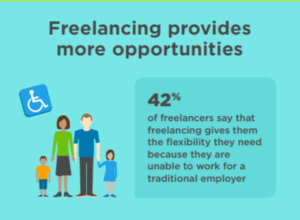 This year, Upwork , a popular platform for freelance workers, and the Freelancers Union conducted a study regarding the popularity of freelance work and how it is changing the workforce. The findings of their study were astonishing. Over the last five years alone the number of freelance workers in the United States has grown by 3.7 million people. That’s the equivalent of the entire city of Los Angeles going to work for themselves. We can attribute these statistics to the growing number of young workers who are looking to take control of their careers as well as the increased availability of freelance work. Check out their great infographic for a high level overview of their findings.
This year, Upwork , a popular platform for freelance workers, and the Freelancers Union conducted a study regarding the popularity of freelance work and how it is changing the workforce. The findings of their study were astonishing. Over the last five years alone the number of freelance workers in the United States has grown by 3.7 million people. That’s the equivalent of the entire city of Los Angeles going to work for themselves. We can attribute these statistics to the growing number of young workers who are looking to take control of their careers as well as the increased availability of freelance work. Check out their great infographic for a high level overview of their findings.
But, the question is, if you are considering freelance work, what does all of this mean for you? Will freelance work add professional value to your life? Or, are the obstacles associated with freelance working enough to send you back to the 9 to 5 for good?
Here we’re going to break down the pros and cons of freelance work to give you an idea of what being a freelance worker REALLY means.
Pro: Technology has made it easier to find freelance work.
If freelancers had to choose one way the internet has transformed their life, it is likely they would choose the fact that it has made it easier to find work. Websites like Upwork and Fiverr and others are a goldmine for freelance workers and provide jobs for over 60% of freelance workers.
Con: More people than ever are freelancing.
According to the study conducted by Upwork, nearly 1 in 3 Americans have freelanced this year. For aspiring freelance workers, this means there is more competition than ever for landing freelance work. However, nowhere in the study did it reference a shortage of freelance jobs.
Pro:Freelancers are more likely to improve their skills than traditional workers.
In a traditional work setting, employees have to argue their case for continuing education to their employer. But, for a freelance worker, the decision to take courses or training to improve their skills is entirely in their own hands. As a result, freelancers often have an edge over traditional workers in terms of skills.
Con: The cost of training is a barrier for many freelance workers.
Unfortunately, the fact that a freelancer’s training is in their own hands also means the responsibility of the cost of training is in their hands as well. Because prices for quality training ranges from hundreds of dollars to thousands of dollars, 53% of freelancers report that the cost of training is an obstacle for them.
